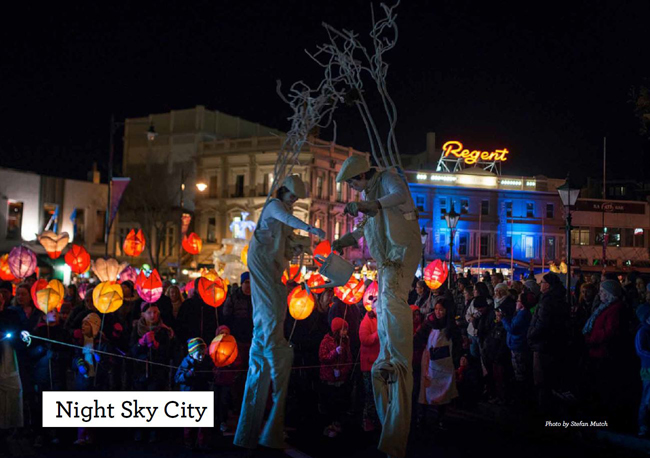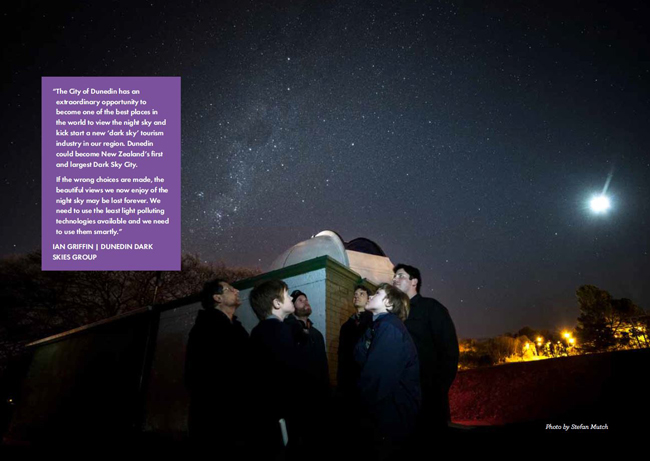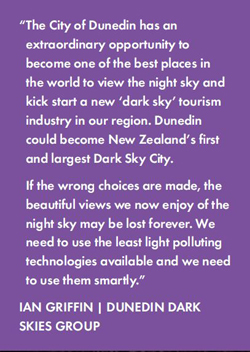
Current position
Dunedin residents are used to experiencing amazing night skies, from the Milky Way to the Aurora Australis. These views are one of the great things about living in our remote part of the world. We also enjoy a night-time cityscape of new and heritage buildings lit to draw the eye. Most recently, work to regenerate Vogel Street in the heart of Dunedin has included the installation of light projectors that shine images inspired by fragments of chinaware found in the area onto the pavement.
Globally, there is increasing concern that we are losing our natural night sky environment to a haze of human light pollution. There is a growing body of evidence that light pollution not only blocks our view of the stars but also wastes energy, costs a lot of money, disrupts ecosystems and can affect the quality of our sleep and our health.
Action and delivery
This action speaks to a simple idea, established by the International Dark-Sky Association (IDA): light what you need, when you need it. Some light at night is necessary for safety and recreation, but light is not the only safety tool and it is clear that with advances in technology we can do this better with energy efficient, smart infrastructure. Dunedin could also be far more innovative with night lighting, using clever lighting to highlight a path to the stadium from the city centre on match days, for example.
The DCC is currently planning, through the asset renewal process, to upgrade Dunedin’s street lighting from low-pressure sodium to light-emitting diode (LED), which will save a significant amount in electricity and maintenance costs. The new LED fittings will also include significant shielding to prevent light spilling upwards. There is a unique opportunity for the city to maximise the benefits of this asset renewal by exploring how to leverage from the upgrade of the street lighting. This action is focused on how to do this.
There are multiple economic benefits on offer. Dunedin would be New Zealand’s first dark sky city, and would lead the way for New Zealand to be the world’s first dark sky country. As a unique selling point for our already strong tourism sector, it is a way to further differentiate New Zealand’s appeal. There is also significant spend on outdoor lighting, and savings free up resources for other activities.
There is great potential for the Night Sky City action to drive innovation and economic development, with our companies, entrepreneurs and communities working to find solutions to our local challenges. Some of these solutions may be of export quality. These economic benefits are supported by the environmental and social benefits that protecting our night sky offers.
Dunedin has an opportunity to test ways lighting challenges can be addressed for the whole country, build expertise in energy efficient outdoor lighting and promote research and adoption of energy-saving measures.
If Dunedin is successful in approaching night lighting in a truly 21st century way, re-imagining how the world’s urban and rural areas approach the dark, we will play our part in keeping our night skies full of stars, now and into the future.
Measuring success
Successful delivery of this action will result in:
- increased visitor nights
- savings on street lighting energy costs
- improved quality of night sky vistas.
Key delivery partners
Several organisations are emerging as key partners in progressing thinking about Dunedin’s night sky, including:
- Dark Skies Advisory Panel and Dunedin City Council
- Dunedin Dark Skies Group
- NZ Transport Agency (Transport Agency)
- Otago Chamber of Commerce
- Otago Museum
- Upstart Trust

Photo by Stefan Mutch
| Confirmed activities | ||
| Delivery activities | Lead organisations | Measuring progress |
|---|---|---|
Establish a Night Sky City Advisory Panel to advise on (1) key city outdoor lighting projects, and (2) the street lighting asset renewal from a big picture perspective |
|
|
Investigate what LED lighting solution(s) are right for Dunedin’s uses, as we have considerable expertise in the city and a number of different desired outcomes |
|
|
Upgrade around 15,000 city street lights to LED over time as part of Dunedin’s asset renewal programme, which will deliver substantial energy and maintenance cost savings |
|
|
Continue to support the growth of key festivals and events that speak to the Night Sky City ambitions, particularly Puaka Matariki and the Midwinter Carnival |
|
|
Investigate SMART control management systems for outdoor lighting |
|
|
Join the LUCI (Lighting Urban Community International) network of cities on urban lighting |
|
|
Develop a specific lighting accord to support Night Sky City action, both preventing light pollution and driving creativity and innovation in the outdoor lighting space, including public engagement |
|
|
Advocate for the upgrade of state highway lights within Dunedin |
|
|
Explore instituting local standards and requirements for private street lights |
|
|
Encourage positive activity (and discourage negative ones) through improved lighting distribution and design of parks and recreation facilities |
|
|
Establish a nationwide network of local and central government to explore the potential of New Zealand as the world’s first dark sky country |
|
|
Develop Night Sky City tourism packages |
|
|
Connect people and projects to the Dark Skies Advisory Panel |
|
|


Photo by Stefan Mutch

